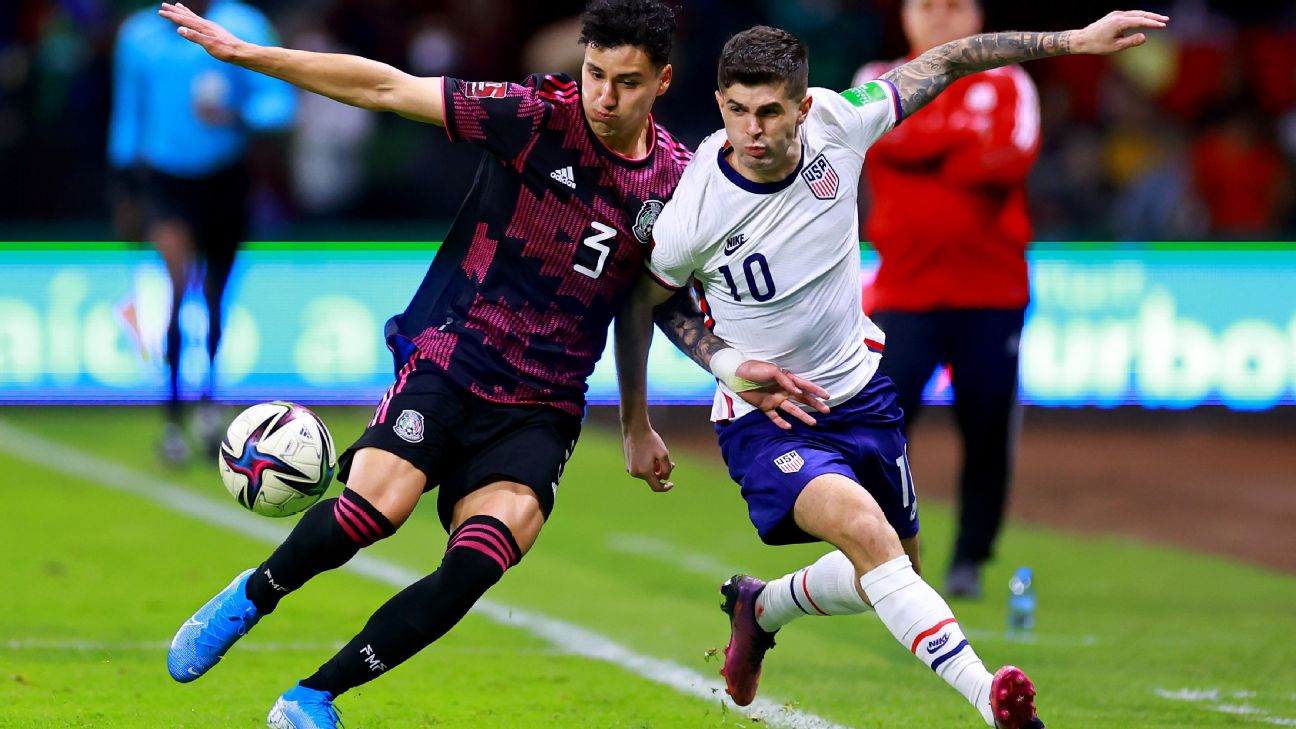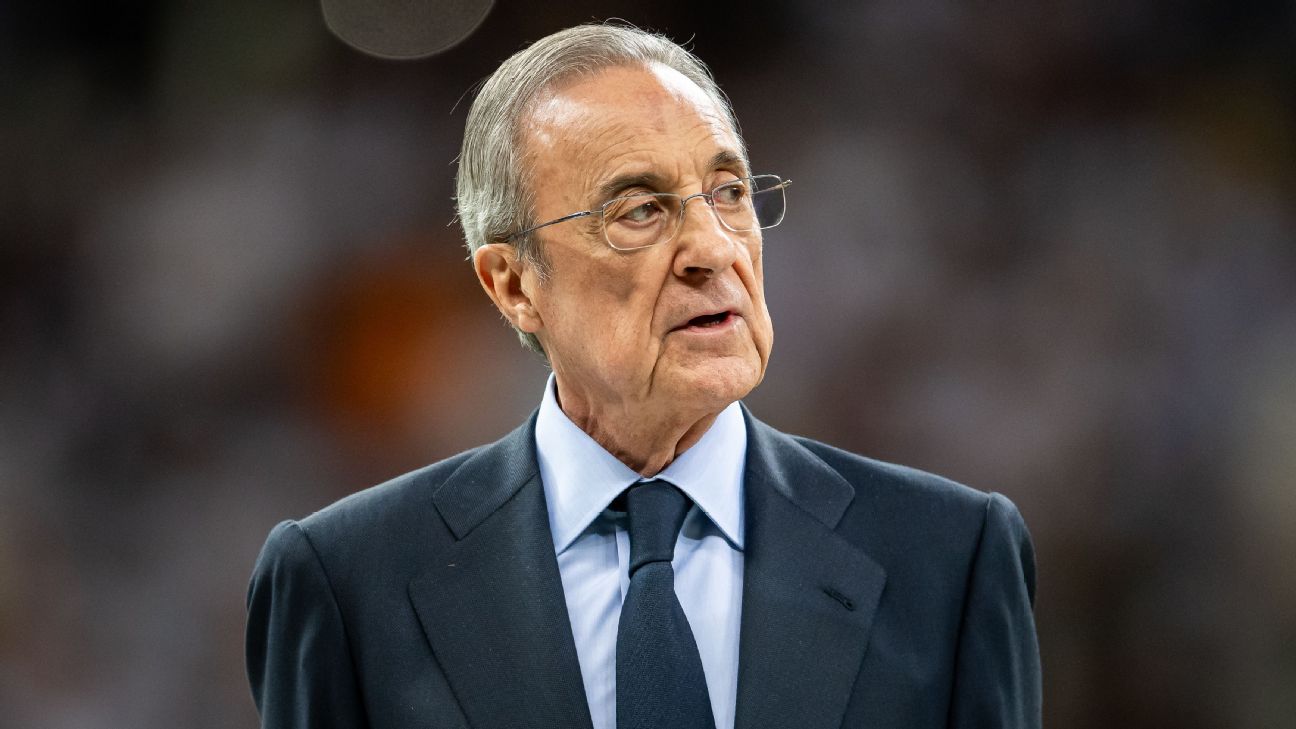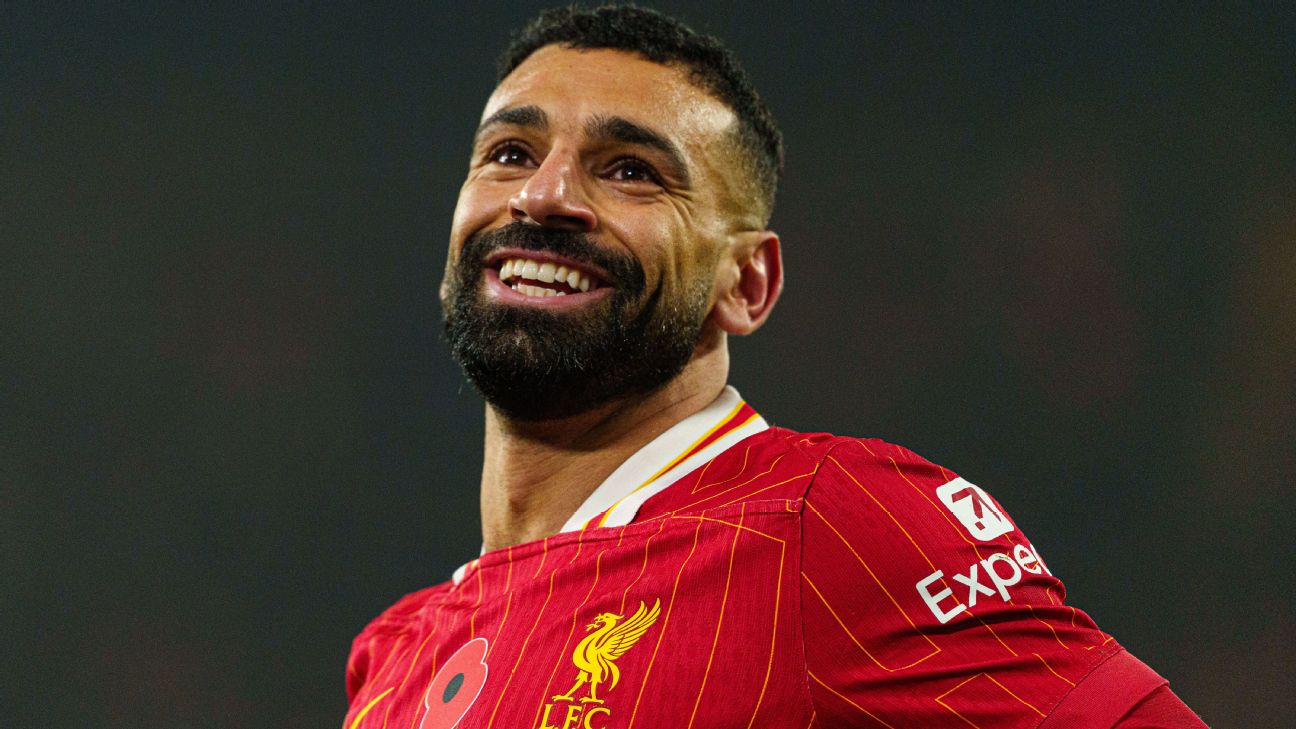This summer is a pivotal one for the men’s national teams of the United States and Mexico. Beginning with their Concacaf Nations League semifinal Thursday at Allegiant Stadium in Las Vegas — and an ensuing final or third-place match on Sunday — both teams will then need to quickly switch gears before the start of another competition: the Gold Cup, which begins later this month.
For the U.S. men’s national team, as defending champions of both titles, this summer is all about maintaining regional dominance despite going all of 2023 without a permanent coach. If you’re keeping track at home, the USMNT is on its second interim coach, B.J. Callaghan, after Anthony Hudson accepted a club job in Qatar earlier this month. Hudson, who took over after Gregg Berhalter’s contract expired in December, had been expected to lead the USMNT at both these summer competitions.
– Stream on ESPN+: LaLiga, Bundesliga, more (U.S.)
Adding a further wrinkle to the summer schedule is the USMNT’s gameplan to split their their roster into two squads. One filled with European-based stars such as Christian Pulisic and Weston McKennie will make the trip to Las Vegas, while a Major League Soccer-heavy roster will lead the way at the Gold Cup.
As for Mexico, they’ll head into these games feeling arguably more pressure as the former longtime giants of North America. Seeking to wrestle back respect and status in the region, new manager Diego Cocca has selected his best group of players for both the Nations League and Gold Cup. Hired in February, the Argentine has taken small steps forward since the World Cup disappointment with a five-game unbeaten streak. Hoping to make a statement in his first year, Cocca will be judged on whether he can at least claim one piece of silverware back from their U.S. rivals this summer.
It’s safe to say that preparations for the 2026 World Cup have officially started, so here’s where the United States and Mexico stand right now.
What have both teams been up to since the 2022 World Cup?
After a World Cup round-of-16 exit that neither surpassed nor fell below expectations, the USMNT have since had a rocky behind-the-scenes journey.
In early January, U.S. Soccer announced that Hudson would take over as interim after revealing an investigation into a domestic violence incident in 1992 regarding the out-of-contract Berhalter and his wife Rosalind. The incident was disclosed by the mother of USMNT forward Giovanni Reyna after Berhalter’s comments at a leadership conference about an unnamed player, who was later confirmed as Gio.
By late January, sporting director Earnie Stewart and general manager Brian McBride left the U.S. Soccer Federation, later leading to the hiring of Matt Crocker as sporting director in April (with an official start date in August). Then, late last month, Hudson stepped away and was replaced by Callaghan — a less than ideal situation as Crocker continues to interview candidates for the permanent coaching spot.
It’s worth noting that while the interview process and coaching search is ongoing, Berhalter remains in the running to be rehired after that investigation found he didn’t break any laws or U.S. Soccer policies, and that he and his wife corroborated the events that happened.
Results-wise for the USMNT, things have been a bit more calm on the pitch. Despite the staffing changes behind them, the U.S. breezed in their March matches with wins over Grenada (7-1) and El Salvador (1-0), as well as April’s 1-1 draw with Mexico in an oddly timed friendly that stretched their unbeaten streak against El Tri to five games.
Mexico have also had plenty of staffing changes. After a dreary early exit in the group stage of the World Cup and the departure of former manager Gerardo “Tata” Martino, Rodrigo Ares de Parga was selected in January as the Mexican Football Federation’s (FMF) new executive director of national teams. Cocca was chosen as men’s national team manager in February and by May, Jaime Ordiales left his role as sporting director for the men’s national teams. Although Cocca has built a good on-the-field foundation with his undefeated streak and a place in the Nations League knockout rounds, that hasn’t eased any worries about narrow results, with El Tri picking up three draws — against the U.S., Jamaica and Cameroon — from his five games in charge. Lots of eyes and attention this week will be on the expected USMNT debut of Folarin Balogun, 21, the Reims forward who committed to the United States over England last month. On loan from Arsenal, Balogun finished the 2022-23 Ligue 1 season as the joint-fourth top scorer with 21 goals (only behind Kylian Mbappe, Alexandre Lacazette and Jonathan David) and could easily be one of top players of the Nations League knockout round. “It’s a fantastic opportunity, not just for me, but for the team,” Balogun said last week about his likely debut. “Mexico and the U.S. have a big rivalry, so I’m looking forward to it. And, of course, there would be no better way to introduce myself than playing against a big opponent where it matters.” Balogun’s numbers have been impressive this season, as he became the first USMNT player to score at least 20 goals in a season for one of Europe’s top five leagues. Alongside him, a number of his new USMNT teammates would greatly benefit from a good Nations League run. Players such as captain Christian Pulisic (Chelsea), Yunus Musah (Valencia), Brenden Aaronson (Leeds United) Weston McKennie (Leeds on loan, from Juventus), Sergiño Dest (AC Milan on loan, from Barcelona) and a handful of other key figures could use a nice change of club scenery that’s propelled by solid summer showings. A strong showing in Las Vegas would especially help Pulisic, who finished with just one goal for Chelsea this season after missing time with a knee injury and amid talks of a potential permanent transfer away from Stamford Bridge. “It’s been a really tough season for me personally and for our team of course at a club level,” Pulisic said last week. “So for me it’s just about coming in here and having a fresh start and being able to be a part of a team that hopefully can come out and win some games.” Better performing players at the club level, like Ricardo Pepi (Augsburg on loan, from Groningen) and Auston Trusty (Birmingham City on loan, from Arsenal), could also gain a leap to a different club through notable Nations League games. For the Gold Cup roster, MLS-based players like FC Dallas’ Jesus Ferreira, San Jose Earthquakes’ Cade Cowell, FC Cincinnati’s Brandon Vazquez, Atlanta United’s Miles Robinson, and New York Red Bulls’ John Tolkin could increase their reported interest from clubs abroad through national team appearances and possible titles. As for Mexico, the big story is a change in the attacking guard that could soon be underway. With injuries to wingers Hirving “Chucky” Lozano and Jesus “Tecatito” Corona, as well as a severe dearth of club minutes for forward Raul Jimenez, all three have been left out of consideration for the Nations League and Gold Cup. Leading the charge in their place is Santiago Gimenez, who won the Dutch Eredivisie title with Feyenoord. With 17 goals in all competitions since January, the 22-year-old is one of the latest breakout European stars and an enticing transfer option for a bigger club abroad. On the flanks near Gimenez in the Mexico front-line, it’ll be a four-way race between Chivas’ Alexis Vega, Atlas’ Jonathan Ozziel Herrera, AEK Athens’ Orbelin Pineda and Cruz Azul’s Uriel Antuna for starting spots. Elsewhere in the Mexico roster, a handful of players such as Edson Alvarez (Ajax), Luis Chavez (Pachuca), Johan Vasquez (Cremonese on loan, from Genoa) and Cesar Montes (Espanyol) could help give fuel to transfer rumors through impressive performances in upcoming matches. Let’s not forget Barcelona right-back Julian Araujo, either. He made his senior debut with the team during a friendly last week in Tokyo against Vissel Kobe. Boosted by his appearance for the LaLiga giants, the California youngster who once represented the USMNT could quickly turn into a game-changing figure for El Tri. If the USMNT can retain both the Nations League and Gold Cup titles with two wildly different rosters, it would be a testament to the depth of the player pool and the continued growth of American men’s soccer. Aiming to peak at the 2026 World Cup, more transfers abroad could follow in the near future for the USMNT setup that is gaining more respect in recent years. Even without a full-time manager in place, it’s worth noting that during a news conference on Tuesday, Aaronson stated that the things have remained the same with someone like Callaghan that has been an assistant for the USMNT for four years. “He knows how we want to play, he knows the players that we have,” Aaronson said. “Not much has changed.” A win or draw against Mexico has often been regarded as a big accomplishment for the USMNT, but a win Thursday would make it six matches without a loss to El Tri — a potentially remarkable stat. For Mexico’s best-case scenario, stealing both titles would highlight that they can once again turn the North American tides in their favor. With Cocca guiding a gradual transition into a younger squad, Mexico could shed its image as an aging and uninspiring roster that is far past its prime. Within an inflated domestic transfer market that often makes it difficult for Liga MX players to move abroad, there’s also a chance that Cocca can provide a platform for more young options in the national setup, thereby making them more visible for potential transfers to European clubs. In a situation where the USMNT fail to hold onto both the Nations League and Gold Cup title, it would be easy to assume that the behind-the-scenes disarray has permeated onto the field. With the interim of the interim taking charge and no full-time manager just yet, it’s not tough to imagine a scenario in which the team’s individual talents won’t be enough to compensate for the lack of a consistent leader on the sideline. There’s a lot of excitement regarding the potential of the up-and-coming USMNT squad, but problems this summer could also signal the possibility of wasting that talent or not giving the right groundwork for those American players to properly thrive. If El Tri don’t win either trophy, the main narrative within the Mexican soccer world will be about the continued regression that the sport is taking on the men’s side. No matter the changes of manager or staffing at the FMF, a lack of trophies this season would mean that more serious improvements and changes would need to be made for the team that only has one regional trophy since 2016. Also there is the question of whether Cocca would be fired if there’s no summer championship. Mexico’s soccer federation (FMF) is notorious for having little patience with their coaches, but Cocca can take solace in knowing that those in charge would give him the benefit of the doubt… for now. “We’re starting a process,” Ivar Sisniega, executive president at FMF, said Monday about how bad results wouldn’t guarantee a firing for Cocca. “The objective isn’t right now, it’s the 2026 World Cup.” Regarding criticism toward his style of coaching, Cocca said on Wednesday : “We want the people who watch to believe in the national team .. There are more who want me to leave than to stay, but we’re convinced about what we’re doing.” Of course, there could be a situation in which neither Mexico or the U.S. succeed. Panama and Canada, set to face off in the other Nations League semifinal on June 15, will both be in the running for the title and will also be contenders for the Gold Cup. The Canadians are certainly a team who could make noise as they try to build on their World Cup appearance in Qatar (their first since 1986), and can make the case of having the best player in the region in Alphonso Davies — who plays as a defender for Bayern Munich but as a winger for his national team. At the Gold Cup, countries like Costa Rica, Jamaica, Honduras and El Salvador won’t be pushovers. With regional dominance up for grabs, it all kicks off this week.
Players to watch: USMNT’s Balogun, Mexico’s Gimenez
The best-case scenarios: Trophies and momentum toward ’26
The worst-case scenarios: Coaching chaos, or a Canada takeover?



